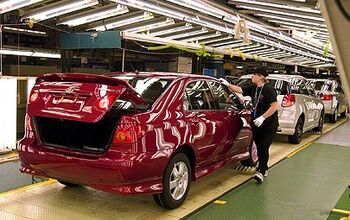Analysis: Toyota Digs In, As Union Vote At Canadian Plants Put On Hold
Unifor has put their union certification vote on hold for Toyota Canada’s manufacturing plants, amid claims by Toyota that the size of the bargaining unit is much larger than expected – derailing Unifor’s assertion that they have met the required threshold for a vote.
According to the Windsor Star, Toyota submitted the names of 7,550 workers that would be eligible for to vote on the union. Unifor initially estimated that 6,500 workers would be part of the bargaining unit, and its claims of being able to produce signed union cards for 40 percent of Toyota’s workforce (the minimum number required by the Ontario Labour Relations Board) were based on this figure.
But Toyota’s new figure now means Unifor has to regroup. According to one labor expert interviewed by the paper, Unifor can challenge that number. Unifor President Jerry Dias said that the company will verify that the workers named are eligible to cast a ballot. The Japanese Automobile Manufacturing Association claims that Toyota employs about 7,400 people at its two plants in Cambridge and Woodstock Ontario, though Dias said that based on the fact that 15 to 20 percent of those workers aren’t eligible to be part of a bargaining unit, Unifor arrived at their number of 6,500.
Prior attempts to unionize Toyota plants, by the CAW and another union, both failed when they too learned that they underestimated the size of the bargaining unit. Tony Faria, co-director of the Office of Automotive Research at the University of Windsor, told the Star that Toyota may be fattening the ranks to get to a higher number.
“I would have to say Toyota is including people who don’t work anywhere close to an assembly line. I presume it could be legitimate. Those people could be part of a bargaining unit.”
Speaking to Reuters, Toyota spokesman Greig Mordue said that Toyota had hired 1,000 new contract workers and transferred 1,000 to “permanent” status since 2013.
While Dias said that there is “no timetable” for a vote, the move comes as the opening shot in what is likely to be a protracted battle to keep Unifor out of Toyota’s plants. The battle between Toyota and Unifor will not attract the attention and fanfare that the UAW did in their efforts to organize Volkswagen’s Chattanooga assembly plant, the stakes are just as high.
No Canadian transplant has ever been organized, and past efforts at Toyota and Honda have been unsuccessful. Honda in particular has waged a major campaign to shut out organizing efforts. Other sources tell TTAC that Honda is simply better at keeping their hourly workers happy.
During our look into Honda’s dealings with the CAW, one industry observer we spoke to (on the condition of anonymity, due to their ongoing work in the Canadian auto industry) explained the importance of keeping Unifor out, from the perspective of Japanese plant managers
“It runs counter to the Japanese concept of loyalty,” our source said. “The whole idea is that if you’re loyal to the company, they’ll look out for you and your best interests. The workers shouldn’t need a union for that.” Honda also doesn’t want an outside force interfering in the way their plants are run. As our source put it “…[Organizing] interferes with the management structure of the plant itself – which is unacceptable to them.” As for what would happen if Alliston, or another Honda plant unionized? “Well,” said my source “ remember what happened to Wal-Mart in Quebec?”
Apparently, that same mentality – including a willingness to shut the plant down – is still in play. Toyota’s opening move is to launch a challenge to Unifor under Canadian privacy laws. As Reuters explains
Mordue said the company would ask Unifor to return the information it now has on Toyota workers, and may challenge the process under privacy laws.
“As part of the process under the Labour Relations Act we’re obliged to provide a full list of every team member in the bargaining unit,” said Mordue.
Mordue said the list included the names, work locations and positions of all of Toyota’s production and maintenance workers, whether they are on leave and the last day they worked.
“More concerning is that Mr. Dias has indicated that he fully intends to use this list in his ongoing unionization efforts,” said Mordue. “We think this is a serious privacy issue and one we’ll be taking up under privacy legislation.”
While Dias told Reuters that Unifor is entitled to the information by law, it is indicative of the kind of battle that Toyota is prepared to wage to keep Unifor out of their plants. Mounting a legal challenge like this, even with its own in-house counsel, is a costly and complex effort – but one that Toyota feels is worth pursuing.
More by Derek Kreindler
Latest Car Reviews
Read moreLatest Product Reviews
Read moreRecent Comments
- SCE to AUX Norway is in Europe, and Tesla is an American automaker - no problems there.I wouldn't use Ford as the bellwether.https://www.reuters.com/business/autos-transportation/tesla-extends-lead-norway-evs-take-record-82-market-share-2024-01-02/https://elbil.no/english/norwegian-ev-policy/
- Steve Biro If the U.S. government wants to talk about banning all connected cars - or at least the collection and sharing of information from said vehicles - I’m all ears. Otherwise, don’t waste my time.
- Ajla Both parties are in favor of banning Chinese vehicles so I don't see how it won't happen in the next year.
- Add Lightness I don't waste a lot of time watching nothing much happening by watching the YouTube 6 minute highlights.
- MrIcky from my rental fleet experience, id rather drive one of these than a camry.


































Comments
Join the conversation
> “It runs counter to the Japanese concept of loyalty,” our source said. “The whole idea is that if you’re loyal to the company, they’ll look out for you and your best interests. The workers shouldn’t need a union for that.” Curiously, Japan itself was force fed democracy incl. trade union law during occupation. Dealing intelligently with people they can't fire is in significant part what birthed lean production,etc that made Japan the powerhouse it is today. Interesting this is coming full circle with the transplants reverting back to hardline labor strategies. Perhaps someone needs to pull a Pearl Harbor on them to start the cycle anew elsewhere...
Wouldn't it be nice if the malcontents that want to organize would just quit their jobs instead of working to get the rest of the Toyota employees fired?